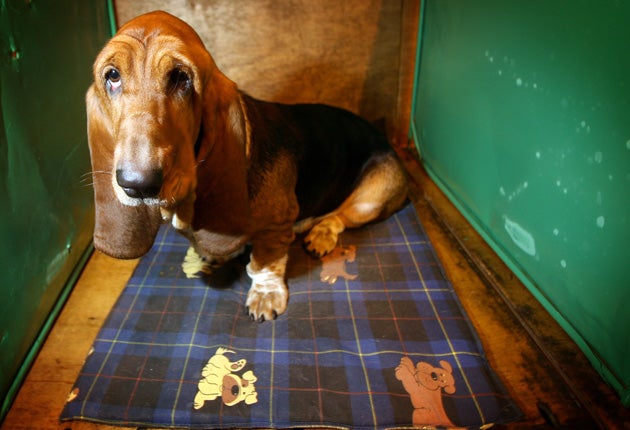Why the long face? Maybe because he's a bowl-half-empty dog

Scientists have shown what many dog owners have suspected – while some canines are joyfully optimistic about life, others have a tendency for gloomy pessimism.
A study has found that dogs can be divided into two personality types based on their emotional outlook. "Bowl-half-full" types are full of hopeful optimism, while their "bowl-half-empty" kennelmates tend to expect the worst.
The researchers believe they have shown scientifically for the first time that dogs experience the same sort of emotional states as people who are faced in similar half-full or half-empty scenarios.
Dogs who are more pessimistic are also more likely to suffer other kinds of behaviour disorders, such as chewing up the furniture or howling uncontrollably when their owners leave them alone at home, the scientists said.
"We know that people's emotional states affect their judgements and that happy people are more likely to judge an ambiguous situation positively," said Professor Mike Mendl of Bristol University, who led the research into canine behaviour.
"What our study has shown is that this applies similarly to dogs – that a 'glass-half-full' dog is less likely to be anxious when left alone than one with a more 'pessimistic' nature," Professor Mendl said.
The findings emerged from tests involving 24 dogs taken in by two re-homing centres. The scientists first assessed each animal to see how they would react to being left alone, which can lead to undesirable behaviours – such as barking or chewing – in about 50 per cent of cases.
The researchers then tested each dog for their levels of "optimism" based on how quickly they would walk or run to a bowl that may or may not contain a small amount of food. The bowl would be positioned ambiguously between two other positions in the room where the dogs had learned what to expect – one where the bowl would always contain food, the other where it would always be empty.
"Dogs that ran fast to these ambiguous locations, as if expecting the positive food reward, were classed as making relatively 'optimistic' decisions. Interestingly, these dogs tended to be the ones who also showed least anxiety-like behaviour when left alone for a short time," Professor Mendl said.
"Around half of the dogs in the UK may at some point perform separation-related behaviours – toileting, barking and destroying objects around the home – when they're apart from their owners.
"Our study suggests that dogs showing these types of behaviour also appear to make more pessimistic judgements generally," he said.
Rachel Gray, a senior lecturer at Bristol who was part of the research team, said that the findings were important in understanding why some dogs show distress when left alone while others seem to cope with the ordeal very well.
"Many dogs are left on their own and they are fine with it. But a large proportion of dogs get very anxious about it and this help to explain why," Dr Casey said.
"However, as yet we don't know whether it is cause and effect. We don't know whether being left alone is more likely to make a dog pessimistic, or whether being pessimistic is more likely to make a dog anxious when left alone. We need to do more research on that," she said.
The study was carried out on a relatively small number of dog breeds so it was also not possible to determine whether certain breeds are more likely to be pessimistic. Dr Casey said that the appearance of any particular breed, such as the notoriously sad face of bloodhounds, is probably not going to indicate their emotional state.
Samantha Gaines of the RSPCA said that many dogs are given away by their owners because they do not cope well with being separated. "This research suggests that at least some of these dogs may have underlying negative emotional states," Dr Gaines said.
Subscribe to Independent Premium to bookmark this article
Want to bookmark your favourite articles and stories to read or reference later? Start your Independent Premium subscription today.

Join our commenting forum
Join thought-provoking conversations, follow other Independent readers and see their replies